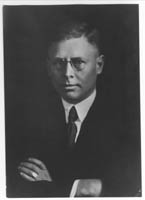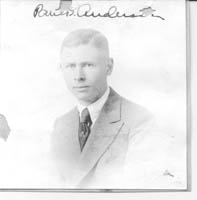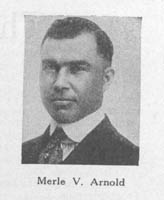Table of Contents
Key Figures
YMCA Secretaries
a | b | c | d | e | f | g | h | j | k | l | m | n-o | p | r | s | t-u | v | w | y-z
A. von Aesch
A Swiss YMCA secretary, von Aesch volunteered to serve as a World's Alliance WPA Secretary in Germany during 1918. He was one of the neutral replacements for the American WPA Secretaries who left the German Empire in February 1917.
Julius Emil von Aesch
A Swiss YMCA secretary, Julius Emil von Aesch volunteered to serve in Austria-Hungary as a World's Alliance WPA Secretary to replace American WPA secretaries who left the Dual Monarchy in April 1917. Von Aesch began POW relief services in Mauthausen, in Oberösterreich, in April 1918, serving Italian prisoners of war. He eventually expanded operations to Deutsch-Gabel, Reichenberg, and Theresienstadt in Bohemia during the summer of 1918. Von Aesch maintained WPA operations for Allied POW's in Austria until the end of the war.
Raoul Allier
A French professor of philosophy at the Sorbonne University in Paris, Allier became an important leader in the World's Student Christian Federation (WSCF) and the Ecumenical Movement. Allier represented France at the Twelfth World's Conference of YMCA's in Amsterdam in August 1891, where he emphasized the role of the Association as a center for justice and fraternity and for the study of social questions. Allier served as the chairman of a conference for French students in 1897. He was elected president of the newly formed French Federation of Christian Students as the result of this meeting. Allier attended the Fourteenth World's Conference in Basle in July 1898, emphasizing the importance of service for students. At the Versailles Plenary Meeting in 1900, the WSCF officially admitted the French Federation of Christian Students as a member organization. Allier continued to be a leader in the WSCF, representing French students at the Constantinople Conference in 1911. When World War I began, Allier mobilized the French Federation to provide relief services for students mobilized by the French Army. The war was particularly tragic for Allier as his only son was killed in battle. Allier met with John R. Mott during the latter's visits to Paris in November 1914 and June 1915. To support French students incarcerated in prison camps in Germany, Allier and the French YMCA collected books and shipped them via the World's Alliance under International Red Cross cover. The American Association paid for all of the shipping costs involved in this process.
D. M. Amaker
This Rhodes Scholar at Oxford University volunteered to conduct War Prisoners' Aid service for Russian prisoners of war incarcerated in Germany after the Armistice. During the Summer of 1920, he provided welfare services to Russian and Central Power prisoners of war on transport ships in the Baltic region during the repatriation process. Amaker conducted a comprehensive inspection of German prison camps in the Fall of 1920 to study how the Association could best assist Russian POW's. He was accompanied by two Russian officials, including a Soviet representative, to observe the morale and physical condition of prisoners; to investigate POW willingness to establish schools, bands, and theatricals; and to assess the needs of the sick. Amaker's investigation opened the door to YMCA services to the 200,000 Russian prisoners still remaining in Germany in November 1920.
Paul B. Anderson (1894-1982)
Anderson was an American YMCA Field Secretary during World War I. He began work with the Association in 1913, serving in the Shanghai YMCA in China until 1917. He then transferred to Russia where he worked in War Prisoners' Aid relief with Central Power POW's and Russian soldiers, remaining in Russia until 1919. He then became the director of the American YMCA's Russian Work, assisting Russian refugees in Berlin from 1919 to 1924, and in Paris from 1924 to 1941. This service not only included providing aid to Russian refugees and students, it also supported the Russian Orthodox Church through religious book publication and seminary assistance. Anderson directed the Russian Student Christian Movement from 1926 to 1977. In 1930, Anderson established the Russian Superior Technical Institute in Paris. He became the International Committee's Senior Secretary for Europe in 1938. He returned to the United States in 1941. Anderson served in the United Nations Relief and Refugee Administration from 1945 to 1947 and became the Associate Executive Secretary for the International Committee in 1947, serving until his retirement in 1962.
Paul Arni
a Geneva lawyer and Swiss YMCA secretary, Arni volunteered to serve as a World's Alliance WPA Secretary to work in Germany after most American WPA secretaries left the Reich in February 1917. He helped J. Gustav White edit an education manual in English, French, and German to help new WPA Secretaries organize educational programs in prison camps. Arni conducted POW relief operations in the Kingdom of Bavaria, beginning in January 1918 and served until the end of the war. He worked with Allied prisoners in the I II, and III Royal Bavarian Army Corps regions.
Merle V. Arnold
An American YMCA secretary, the International Committee assigned Arnold to serve members of the Allied Expeditionary Force in Archangel during the Russian Civil War. He then volunteered to serve Russian prisoners of war in post-war Germany. He served as a WPA Secretary in northern Germany, visiting prison camps in Pomerania and Mecklenberg from November 1920 to February 1921.
Karl Theodor Georg Axenfeld (1869-1924)
A German evangelical theologian, Axenfeld was born in Smyrna in Asia Minor, the son of a Prussian consulate pastor. He studied theology at the Universities of Berlin and Halle and became involved in missionary work. In 1904, Axenfeld went to German East Africa as the leader of the Berliner Missionarbeit and returned to Germany in 1913. He became director of the Protestant Mission in Germany and was a close friend of John R. Mott. Axenfeld strongly supported the introduction of War Prisoners' Aid services to Allied POW's in German prison camps. In 1919, Axenfeld was one of the German delegates at the Versailles Peace Conference, representing the interests of German missionaries. He was gravely disappointed by the Allied decision to deny German missionaries access to the lost colonies.


